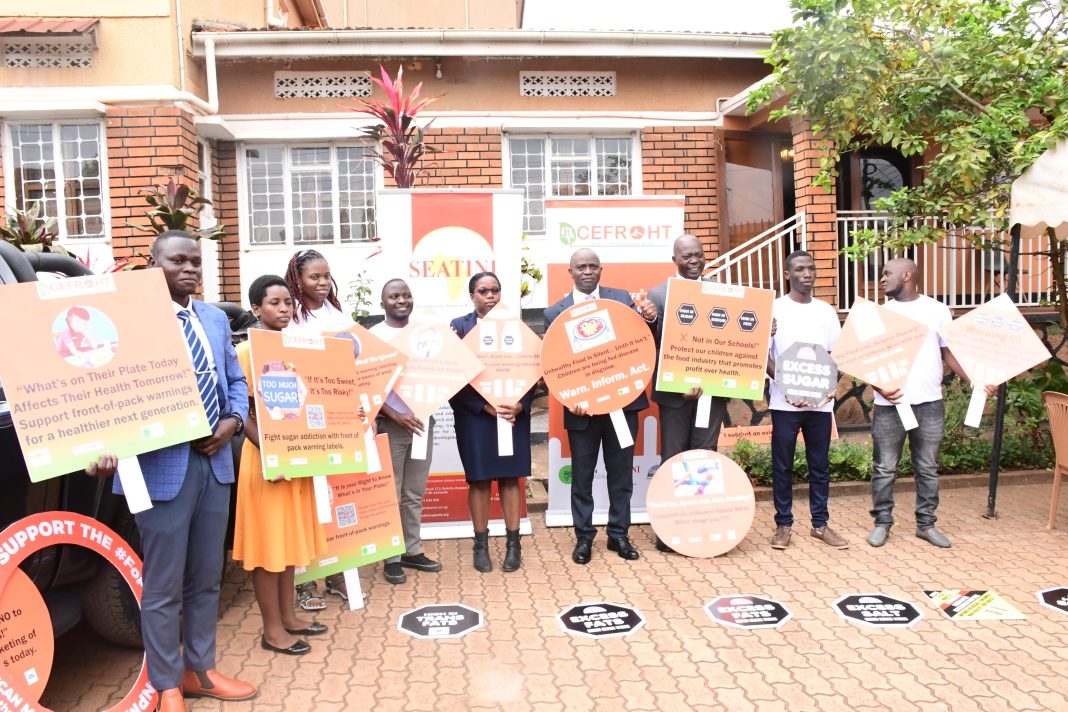By David Mwanje
Uganda— In a bold stand against the creeping tide of diet-related diseases, a coalition of civil society organizations SEATINI-Uganda, CEFROHT, CONSENT-Uganda, and FIAN-Uganda has issued a clarion call to revolutionize Uganda’s food landscape.
Their rallying cry, delivered in a fiery press conference on yesterday, demands an immediate ban on junk food in school canteens, swift approval of the Nutrient Profiling Model (NPM), and curbs on predatory advertising targeting children. With obesity and non-communicable diseases like diabetes and cancer surging among Uganda’s youth, these activists are fighting to ensure the nation’s children aren’t fed “poison disguised as love.”
The statistics are alarming. Uganda’s Demographic Health Surveys reveal that 32.3% of school-aged children (3–16 years) are obese, with 21.7% overweight, and non-communicable diseases now claim 33% of all deaths. Cheap, ultra-processed foods loaded with sugar, salt, and trans fats are flooding school canteens and markets, some costing as little as UGX 500.
“We cannot continue feeding our children poison and call it love,” warned David Kabanda, CEFROHT’s Executive Director. “Failing to pass the Nutrient Profiling Model violates our Constitution and endangers lives.” The NPM, a tool to classify foods by nutritional value, is seen as a lifeline to guide healthier choices and curb harmful consumption.
The coalition paints a grim picture of an unregulated food environment where bright packaging and catchy jingles lure children into lifelong unhealthy habits.
Henry Kimera of CONSENT-Uganda called out the food industry’s tactics saying, “Aggressive ads with cartoons and celebrities make junk food seem fun, but they’re dangerous when consumed regularly.” From sugary drinks to salty snacks, these products dominate children’s diets, even in pre-schools, where kids as young as two are exposed.
Professor Achileo Kaaya, a food technology expert from Makerere University, sounded the alarm on ultra-processed foods saying, “They strip away natural nutrients and add harmful sugars and fats, leading to obesity, diabetes, and even colon cancer.” He urged parents, schools, and policymakers to prioritize fiber-rich, natural foods.
The CSOs are pushing for a five-point plan, ban junk food in schools, fast-track the NPM, regulate child-targeted ads, raise public awareness, and mobilize stakeholders.
Rehema Namaganda of FIAN-Uganda stressed the need for a national food and nutrition framework adding “The NPM will empower Ugandans to make informed choices and deter dangerous products.” She pointed to global success stories like Chile, where sugary drink sales dropped 23.7% after strict policies, and the UK, with its advertising bans.
Uganda’s Shs 11.4 trillion Human Capital Development budget for 2025/26, they argue, must fund these reforms to safeguard future generations. This fight dovetails with Uganda’s broader economic goals, as seen in initiatives like the NSSF Hi-Innovator Program, which empowers youth in agriculture to boost local food production.
Yet, the rise of Type 5 diabetes linked to obesogenic environments underscores the urgency. “If we don’t act, we risk our food security and socio-economic progress,” said Jane Nalunga of SEATINI-Uganda. Uganda stands at a crossroads—ready to choose health over harm for its children.























